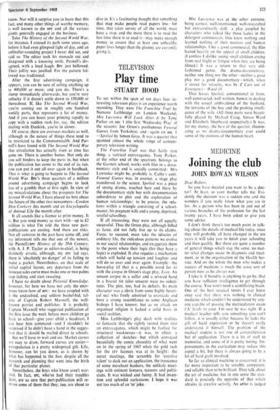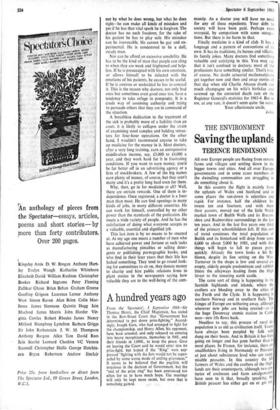Joining the club
MEDICINE JOHN ROWAN WILSON
Dear Robert.
So you have decided you want to be a doc- tor? At least, so your mother tells me. Evi- dently the decision was a sudden one and she wonders if you really know what you are in for. As a person who has been in and out of various branches of the profession for the last twenty years, I have been asked to give you some advice.
I don't think there's too much point in talk- ing about the details of medical life today, since they will probably all have changed in the ten years it will take you to finish your schooling and then qualify. But there are quite a number of general things which stay the same, no mat- ter what changes occur in diagnosis and treat- ment, or in the organisation of the Health Ser- vice. And on the whole the man who makes a success of medicine is much the same sort of person now as he always was.
I take it, if heredity is anything to go by, that you have sufficient intelligence to get through the course. You won't need a scintillating brain. One of the best surgical tutors I ever knew once said that there was nothing in clinical medicine which couldn't be understood by any- one capable of passing the matriculation exam ('A' levels to you). l'm sure he was right. If a medical teacher tells you something you can't follow, it is usually either because he lacks the gift of lucid expression or he doesn't really understand it himself. The problem of the medical student is not one of comprehension but of application. There is a lot of stuff to memorise, and some of it is pretty boring. Im- provements in the curriculum may reduce this aspect a bit, but there is always going to be a lot of hard graft involved.
So far as clinical medicine is concerned, it is far more important to be sensible, competent, and reliable than to be brilliant. They talk about the art of medicine, but in one sense the stan- dard is precisely the opposite of that which obtains in creative activity. An artist is judged
not by what he does wrong, but what he does right—he can make all kinds of mistakes and yet if he has that vital spark he is forgiven. The doctor has no such freedom; for the sake of his patient he has to play safe. His mistakes can be irrevocable. He cannot be gay and ex- perimental. He is condemned to be a dull, steady man.
Nor can he afford an excessive sensibility. He has to be the kind of man that people can cling to when they are weak and frightened and help- less. If be is preoccupied with his own emotions, or allows himself to be infected with the emotions of his patients, he ceases to be useful. If he is anxious or undecided he has to conceal it. This is the reason why doctors, not only bad ones but sometimes even good ones too, have a tendency to take refuge in pomposity. It is a crude way of assuming authority and trying to persuade others that they are in command of the situation. _ A breathless dedication to the treatment of the sick is probably more of a liability than an asset; it is likely to collapse under the strain of examining stool samples and holding retrac- tors for four-hour operations. On the other hand, I wouldn't recommend anyone to take up medicine for the money in it. Most doctors, after a very long training, earn an unimpressive middle-class income, say, £3,000 to £4,000 a year, and they work hard for it in frustrating conditions. If you want to earn money, you'd be far better off in an advertising agency or a firm of stockbrokers. A few of the big names earn plenty of money, of course, but they aren't many and it's a pretty long haul even for them.
Why, then, go in for medicine at all? Well, there are certain rewards. One of them is in- dependence. Once registered, a doctor is a freer man than most. He can find openings in many kinds of jobs, in many different countries. He can work for himself, controlled by no other power than the standards of the profession. He meets a wide variety of people. And he has the satisfaction of doing what everyone accepts as a valuable, essential and dignified job.
This last item is by no means to be sneezed at. At my age one meets a number of men who have achieved power and fortune at such tasks as manufacturing pintables or selling deter- gents or publishing pornographic books, and who find in their later years that their life has lacked something. They tend to go round look- ing for committees to sit on, they donate money to charity and hire public relations firms to plant stories in the newspapers saying how valuable they are to the well-being of the corn- munity. As a doctor you will have no need for any of these expedients. Your debt to society will have been paid. Perhaps even overpaid, by comparison with some occupa- tions. But there is no harm in that.
Finally medicine is a kind of club. It has a language and a pattern of conventions of its own. It has its traditions, its heroes and villains, its family jokes. Many doctors find something valuable and satisfying in this. You may say that it isn't confined to doctors; most of the professions have something similar. That's true, of course. No doubt actuarial mathematicians get together now and then and swap stories of that day when old Charlie Abacus drank too much champagne on his wife's birthday and screwed up the corrected death rate on the Registrar General's statistics for 1963-4. But to me, at any rate, it doesn't seem quite the same.
Your affectionate uncle,
John.







































 Previous page
Previous page